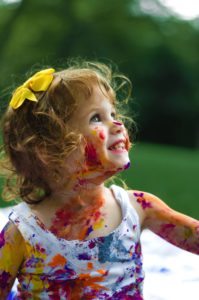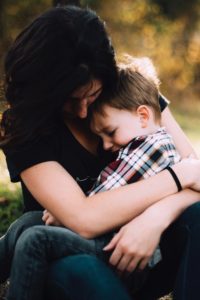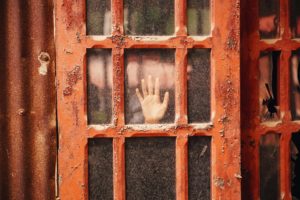by Jenny Rose | Dec 8, 2016 | Power
I’m thinking about money today. This is not new. Sometimes I think most of my life has been consumed by thoughts about money. Well, not thoughts so much as panic, guilt, shame and worry.

Photo by Teddy Kelley on Unsplash
There’s a heavy snowstorm here in central Maine. I’ve just been standing looking out my attic window, watching it fall on the huge elderly maples, bare as old bones, and the grass and the street and our little black Hyundai car in the driveway.
We found out this morning the car needs about $1,300 worth of work. Almost exactly what it’s worth. Time to make choices.
We went out to walk, my partner and I. I didn’t cover my head, and when we got home my hair and eyelashes were clotted with wet snow. My son, who had gone out to run errands, was backing into the driveway as we came home. He’d been meditating in a ditch, not being able to get in touch with us, after sliding off the extremely slick road and into a guy wire securing a telephone pole. Some kind soul drove by and pulled him back onto the road. Fortunately, my son wasn’t dented, but the car was. This, needless to say, does not improve the resale value!

Photo by Caley Dimmock on Unsplash
I also took time this morning to buy Christmas gifts, so I’ve been absorbing all the jingle bells, merry merry and buy buy online. Quite a contrast, all the glitz and glitter, deals and special buys and impossibly joyous advertising, to the silent world outside the window, grey, smoke blue, brown, dark green and the ivory snow. Over the years, I’ve done less and less gift exchange for Christmas. There are only two people left with whom I do it, not because I don’t love giving gifts but because of financial stress and my resentment of the pressure to consume.
I’ve always had a dreadful relationship with money. My earliest understanding of what it was became inextricably tangled with anguish, fear, rage and power issues. As a child, I was always afraid there wouldn’t be enough. As an adult, I was locked in a belief that money defined me. To have money was to be successful, and to not have it was to be a failure. There was a well-known and well-defined path to follow: Graduate high school with top grades and scholarships, obtain a college education in something employable and lucrative, get a job with benefits, and never NEVER touch the principal. If you must borrow, pay off ASAP and stay out of credit debt. Save for retirement, own your own home and pay off the mortgage, take vacations and have a nice car.
However, during my lifetime the world has changed considerably. The middle class from which I came has all but vanished. I didn’t want to go to college, but did it because it was expected. I didn’t get a good scholarship and felt guilty every day I was there, and my guilt was made worse by the fact that the only subjects interesting me were religion, literature, history and the like. After two years, I dropped out. (Note: Dropouts are NOT successful. Ever.) I’ve been working ever since.
Then I got divorced (credit card debt), saved for retirement but cashed a couple of those accounts for emergencies, lost all my investment money to a crooked contractor, never took a vacation or even a plane ride out of my own pocket, and never in my life bought a new car. Retirement? You must be kidding. What are the chances there will even still be social security by the time I’m 65?
This is in no way a remarkable biography, I realize, but for me there’s a red stamp across every page of it that says FAILURE.
I’ve only in the last two years really understood how much power I gave money to define who I am and what I’m (you guessed it) worth. The idea of monetary value, like sexism, is embedded in our very language. There’s no escaping it. In my culture, the failure to make and spend money in ever increasing amounts is unpatriotic, unattractive, unsuccessful and sometimes illegal.
This is all wrong. I feel like the little boy who said out loud the emperor had no clothes. Everyone was appalled and shushed him, lest the emperor hear and be offended.
I know myself to be an intelligent, heartful, creative, empathetic, honest person. The numbers in my bank account have absolutely nothing to do with those qualities.
The most important things in my life are my healthy relationships. Again, the numbers in my bank account have no influence over my ability to love and be loved and connected. (Hint: A relationship dependent on money doesn’t fit my definition of healthy. Just sayin’.)

Photo by Senjuti Kundu on Unsplash
My ability to be present, entertain joy, laugh, create and learn has nothing to do with money.
My enormous talent for life has nothing to do with money.
Unfortunately, our broken system does require money for health care and the necessities of shelter, food and water. To be human is to need these basics. Not having money for them is the experience of increasing numbers of Americans and the vast majority of others in the world. I myself don’t have the money to buy health insurance. Does that mean we’re all failures?
Of course not.
Not only that, but we’re exhausting our global resources and when no amount of money will buy food and water we’ll all starve together, regardless of our bank balances.
So, yeah, we’re going to have to figure out what to do with the car. We’ll have to get a loan and work on finding a good used vehicle that can deal with our weather. It will mean a monthly car payment. No idea how we’ll do it, but I know we’ll find a way. Before that, we may have to do some work on the Hyundai in order to get top price for it.
But none of that is about me, or what I’m worth in the world, or what I can do or be. It’s all just static and distraction. It’s not failure or success, it’s just that cars age out and need to be replaced. If I could go out and buy a brand-new Subaru, it wouldn’t be failure or success, either. It would be CONVENIENT and LUCKY.
Here are a couple of Christmas presents from me to you. The first is a quote and the second is an old wisdom tale from the Hindu tradition, one version of which is in More Ready-To-Tell Tales from Around the World, edited by David Holt and Bill Mooney, and told by Jim May.
“It is no measure of health to be well adjusted to a profoundly sick society.”
–Jiddu Krishnamurti
The Ruby
A holy man awoke, as usual, in the hour before dawn, on his mattress of grass. A warm wind moved across the land, bringing the scent of dust, animals, early morning cooking fires and blossoms, fresh and sweet in the cool morning.
The holy man was beginning his morning prayers when an excited young peasant ran up to him. “Master, where is it?”
The holy man raised an inquiring eyebrow.
“I had a dream,” said the peasant, calming himself. “In my dream, I met a holy man at the edge of the village. And here you are! The holy man gave me a precious jewel.”
“Ah, yes,” said the holy man. He bent and pulled from beneath his mattress of grass a ruby the size of his fist. “You must mean this. I have no use for it.”
He handed it to the peasant, who had never held more than two copper coins in his hand. The peasant raised the ruby between himself and the rising sun and his awed face was washed in red shadow. He walked slowly home, his eyes fastened on the ruby. He entered his simple hut and sat down on the dirt floor with the ruby before him.
All day he gazed, enchanted, and dreamed of what the ruby could buy him. He forgot his morning prayers. He didn’t eat, bathe, or take care of his livestock. He didn’t scythe grass for hay. When night came, he didn’t say his evening prayers, make a meal or lie down and rest. He sat before the ruby, worshipping.
The next morning the peasant took the ruby in his hand and went out, searching the fields for the holy man. When he found him, he handed the ruby back to him.
“This is not the precious jewel I want. Teach me what you know that made it so easy for you to give it away.”
All content on this site ©2016
Jennifer Rose
except where otherwise noted
by Jenny Rose | Nov 10, 2016 | Connection & Community, Emotional Intelligence, Shadows

Photo by David Beale on Unsplash
My partner sent me this quote this morning, and inspired this week’s post.
“Being able to feel safe with other people is probably the single most important aspect of mental health; safe connections are fundamental to meaningful and satisfying lives. Social support is not the same as merely being in the presence of others. The critical issue is reciprocity: being truly heard and seen by the people around us, feeling that we are held in someone else’s mind and heart. For our physiology to calm down, heal, and grow we need a visceral feeling of safety.”
— from p. 79 in The Body Keeps the Score by Bessel van der Kolk
As I draft this, it’s Election Day. It’s a work day for me, but I have a long break between a morning and evening shift, so I voted, ate lunch and worked on a big clean-up project my partner and I are undertaking in an outbuilding on our place. The clean-up involves dust, dirt, trash, food debris, rodent and bat droppings, broken glass, sticky empty bottles and cans and cigarette butts. It’s filthy work, but this afternoon, forty-five minutes before I go back to my pay-the-bills job, I feel happier and more peaceful than I have all summer.
I feel safe.
My earliest memories are of feeling unsafe. The people around me were unhappy and unwell. The air was heavy with tension and unexpressed feelings. I was afraid all the time, and I knew that was bad, because it irritated the adults, so I tried to hide it. The world was unpredictable, inconsistent and baffling. Ever since those days I’ve comforted myself in times of stress and fear with a fantasy of being held in loving, protecting arms and feeling safe.

Photo by Jordan Whitt on Unsplash
I’ve been ashamed of that need. If I verbalize such a need, people will hasten to assure me that life isn’t safe, as though I haven’t figured that out, as though that wasn’t the point in the first place! An internal, jeering voice calls me a baby; a weak, pathetic thing, dependent and needy.
Yet safety is the most important thing to me in relationship, and healthy relationship is the most important thing to me in life. I want it more than I want money, more than I want a dream house, more than I want anything I could buy. At this point in my life, I’d much rather be alone than be in relationships that don’t feel safe.
I suppose safety is a term we each define differently, but I know what I mean by it. I mean knowing my thoughts, needs and feelings count. I don’t want to be the most important person in the picture, but I want to be as important as everyone else.
One of the things I need to feel safe is an orderly and predictable environment. That’s why raking up trash, sweeping, packing the car with bottles and cans and watching the man in the bottle shop count them is so satisfying. Creating order out of chaos stops my bleeding. Empty space, a clean dirt floor with the drag marks of the rake in it, allowing the dusty scent of old wood and fallen leaves to replace the smell of stale cigarettes and beer, are all calming. The energy of broken glass and animal-torn trash, the debris of self-destruction, is released. I can breathe again. There’s peace. I’m safe.
I’ve seen a lot of headlines about the national stress around this election. Political opinion and affiliation aside, I think most of us can agree we’ll be relieved to have it over. At this point it’s hard for me to even care who wins — I just want the hate and intolerance to end. It hurts me to see us tear ourselves apart, as friends and families, as communities, as a nation, as a globe. It creates no safety for anyone. We’re all vulnerable to hate.
This afternoon, breaking down cardboard and recycling bottle caps, I knew that part of my feeling of relief is that this election is over today. Whatever happens now will happen, and we’ll all have to go forward. Likely what’s ahead won’t feel any safer than what’s behind, but at least it’s movement away from this.
I wish I could take the last year of presidential campaigning and empty out the dregs of malodorous advertising and sound bites, sort out the ridiculous from the frightening and bag each speech, event and word. I wish I could sweep our memories clean of it, pick up the shattered broken glass of integrity; rake up all the greasy, moldy, broken egg shell stinking scandals and e-mails and recordings.
I wish America felt safe to me.
I wish Democracy felt safe to me.
The Morning After
As I sit down to finish this post, American voters have chosen a new president, and I wept as I ate breakfast with my partner.
As the day has passed and I’ve gone for a swim, taken myself to lunch and gotten a haircut, I realize what lies beneath my anger, despair and incredulous disbelief.
It’s right back to the beginning of this post. I’m afraid. I don’t feel safe. Overnight I seem to have become disenfranchised because I’m female, I’m not a Christian and I’m deeply concerned with human rights and freedoms and our planet.
I also realize I’m not alone. This election has been based in fear. In our fear, we’re truly united. Everyone fears something. We’re all looking for safe, strong arms to shelter in. Pick any campaign issue, and you’ll find fear. There’s fear of climate change, fear of economic collapse, fear of immigrants and shifting population demographics, fear of war, religious fear, fear of illness and disease. We all live in fear that someone or something will take our power away, and that fear makes us weak and vicious.
Fear breeds hatred. Racism, misogyny, censorship and terrorism are fear-based behaviors, Great-and-Powerful-Oz distractions that hide cowardice. The world is changing, and we’re terrified. We look for someone or something to blame. We look for someone or something to save us. In our fear, we cling desperately to our ideologies and annihilate any who disagree with us or question our beliefs. In our fear, we seek a hero/heroine, a representative of what we feel is just and right, someone who will help us retain our power, someone who will assure us there are no monsters under the bed.
Here’s what I believe: Power-over is always and inevitably doomed to fail, sooner or later. The only sustainable way forward is power-with one another.
None of us are safe until all of us are. Safety at the expense of another’s terror and repression is an illusion.
I pray for peace and unity for us in the coming days, months and years, but if that is not to be I will fight. Every Hitler and Pol Pot, every Sauron and Voldemort, create by their very existence heroic resistance that cannot be silenced. I will not turn against my friends, neighbors, families and communities in fear and do the bully’s work for him. I’ll work to undermine the bully himself, and I won’t stand alone.

Photo by Tim Gouw on Unsplash
Has anyone read the book I quoted at the beginning of this blog? Please comment about it if you have. I’m adding it to my reading list.
All content on this site ©2016
Jennifer Rose
except where otherwise noted
by Jenny Rose | Aug 4, 2016 | Connection & Community, Emotional Intelligence
Stories. How many stories can you tell about your life?
Story has always been deeply embedded in the human experience. Every piece of art tells a story. We read, watch television, go to movies, listen to the news, fall in love with music. Stories, all.
Stories teach, entertain, connect, inspire and guide us.
Stories are prisons and torture chambers. They brainwash and manipulate. They can be powerfully limiting.
The paradox of story lies in the power we give it.
Think about a story from your own life. Something painful. Likely it’s a story you’ve told yourself many times. It’s important. It’s part of who you are and how you understand yourself. It’s a place from which you look at the world. It’s absolutely True. You know. You were there. It was such a crippling experience you can’t ever, ever forget.
Stories can’t happen in a void, so there’s an event of some kind, an action, a word, a relationship, other characters in your story.

Photo by Takahiro Sakamoto on Unsplash
Let’s say your story is about four people who spend an hour together on a walk. In that hour everybody sees, smells and hears, thinks and feels different things. After that walk, and maybe for years afterward, each of those four people can tell a story about that day, that walk, that experience. Every one of those stories is partly true. Every one of those stories is inadequate and incomplete. The truest story is the one all four people tell together. If one person’s story is refused, denied, disbelieved or lost, all four people have lost something important out of that hour of their lives. They’ve lost an opportunity for understanding, for compassion, for connection and for becoming just a little bit bigger.
The thing about story is that we create it. Something happens. We have an experience. We have feelings, like mad, glad, sad or scared. We have thoughts about our feelings. We make up a story. We tell it to ourselves over and over again as we try to make sense of our experience, or recover from some hurt. We believe our story to the point that we refuse to consider changing it. We behave as if our story is True.

Photo by SHTTEFAN on Unsplash
Now we have a story that imprisons us. The story has all our power. We hurt people, break relationships and viciously defend our story. We will kill people, including ourselves, to maintain our story. Not only that, others must accept our story in its entirety. They must never question it, add to it or take away from it. Our story becomes us. A threat to our story becomes a threat to our life.
We’ve made something up, chosen to believe in it and now it rules us.
A lot of people talk about truth and lies as though one is black and one is white. As a storyteller, a writer and a human being, I question that. What is truth, really? If I was walking with you on that day and I saw a beautiful grass snake and you saw a dangerous serpent, which one of us is lying? What is the truth? I was charmed, you were horrified. So, I must be a sensitive scientist type with big glasses and a mouthful of Latin. And you’re a beautiful, sexy woman with big boobs and brown eyes who needs to be taken care of in the terrifying outdoors.
There. That’s my story. I’m sticking to it. Don’t you dare try to give me a different version.
See what I mean?
Isn’t the truth that two people saw a snake and had two different experiences and sets of feelings around it? Don’t we all have histories, fears, beliefs, prejudices, expectations and filters through which we experience life? Are yours right and mine wrong? Are mine right and yours wrong?
Can’t we allow room for everyone to experience what they experience?
Some people lie, deliberately and with intent. We all know people like that. We learn quickly not to trust them.
Some people distort. They’re caught up in their story about themselves, about the world, about others. They’ve been deeply damaged and wounded, or they struggle with addiction, or they have health problems, or they take medication, or they struggle with mental illness. Am I prepared to call them liars?
No. But I recognize the danger of some of their stories.
Does investment in a distorted story mean the storyteller is not a valuable person worthy of love and compassion? I hope not. I’ve my own set of distorted stories. I think we all have.
Other, very dangerous people deliberately manipulate with story. They invalidate yours in favor of theirs. They tell you you’re wrong, you didn’t understand, you’re too sensitive, you’re too dramatic, you’re too crazy; you’re hateful, bigoted, disloyal, a liar. They tell you your story didn’t happen, that they didn’t hit you, even though there’s blood in your mouth.
So what do we do about story — ours and everyone else’s?
Maybe the most important thing is to be aware that much of what’s happening in our head is a story. It might be partly true. It might not be. It’s certainly part of something larger than our point of view. Our feelings are ours and we need to honor them, but our thoughts about our feelings can become a real problem.

Photo by Toa Heftiba on Unsplash
We could ask others about their stories. We could be open, curious, nonjudgmental, compassionate, respectful and prepared to be enriched by someone’s perceptions and experiences. We could, in short, build healthy connection.
If we’re holding tight to a story that hurts us, angers us, or is otherwise destructive, we could go to other characters in the story, tell them how we feel and ask for help understanding the situation.
We can build trust and respect with ourselves. We can claim the power and dignity to form our own opinions about others, based on our own observations and experience, and decide when to build connection and when to limit it. We can refrain from repeating destructive stories to or about others. We can take responsibility for our own rigidity and blind spots; our intolerance, injustice and poor communication skills, and own that we might make mistakes in judgement.

Photo by James Pond on Unsplash
We can be wary and watchful of people who impose their stories on us. Some people use story like a hammer and chisel, relentlessly splitting connection and relationship. In the end they hurt themselves the most, but many a relationship has been lost because of this kind of behavior.
We can pay attention to red flags such as feeling confused, feeling torn, feeling overwhelmed, feeling exhausted by drama, and feeling dragged down or being asked to keep destructive secrets. Healthy people in our lives who truly love us will never try to split us from others or force us to make a “them or me” choice. Healthy people do not share destructive personal stories about others publicly, nor do they tolerate or enable this kind of behavior. Healthy people communicate honestly, directly and clearly and recognize the ineffectiveness of black-and-white thinking.
In the end, our only power lies within the circumference of our own lives. If we want others to give us a chance to speak when someone tells a distorted story about us, we must do the same for them. If we want to be heard, understood and treated with respect and compassion, we must extend those to others. If we’re hurt and angry, we must find appropriate and effective ways to talk about that, either with a professional or with others in our story. We can’t control what others say and believe about us. We can only live the most authentic lives possible and hope that our actions and words speak for themselves. We can be responsible for our own stories.
For more on the power of story, here’s another blog you might be interested in. Same subject, different writer. It’s titled Who Are You?
Also, here’s a link to a remarkable teacher, Byron Katie, who asks, “Who are you without your story?” I highly recommend her.
Do your stories about yourself limit you? Do your stories about others limit them? Can you consider another version of one of your stories? What needs to happen for you to revise one destructive story you’ve created?
All content on this site ©2016
Jennifer Rose
except where otherwise noted









